|
|
|
Sort Order |
|
|
|
Items / Page
|
|
|
|
|
|
|
| Srl | Item |
| 1 |
ID:
119196
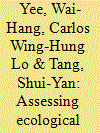

|
|
|
|
|
| Publication |
2013.
|
| Summary/Abstract |
This paper compares the key arguments of ecological modernization theory (EMT) with the reality of recent environmental reform in China. Based on data gathered from a survey and in-depth interviews with executives from Hong Kong-based enterprises operating in Guangdong province, we examine the changing roles of government, market, and civil society actors in the reform process, focusing on various types of pressures these actors have exerted on business enterprises. Compatible with Mol's (2006) conjectures, ecological concerns have gradually gained a foothold in existing political, economic, and to a lesser extent, social institutions. Yet, the relevant actors and their patterns of interactions differ from what EMT generalizes from Western European experiences. Specifically, local governments are assuming a more formalized relationship with firms in regulatory enforcement. Among market actors, organizational buyers along the supply chain have exerted more noticeable pressures on manufacturing firms than industrial associations and individual consumers. Civil society, while remaining less of an institutionalized actor in the environmental policy process, appears to pose a perceptible threat to at least some firms.
|
|
|
|
|
|
|
|
|
|
|
|
|
|
|
|
| 2 |
ID:
124424


|
|
|
|
|
| Publication |
2013.
|
| Summary/Abstract |
Indigenous peoples are often perceived as custodians of nature owing to their close relationship with their environment and their nature-based livelihoods. This paper investigates the kinds of environmental agencies that are constructed for, and by, indigenous peoples within the United Nations (UN) Permanent Forum on Indigenous Issues (PF) and the Arctic Council. The particular focus of this research is the issue of responsibility. The article brings together empirical materials from the two forums and engages with them using Foucault-inspired approaches. We offer a critical discussion of indigenous peoples' environmental agency in international politics, addressing the need to problematize representations of indigenous agency that to date have been largely unchallenged in both the practice and study of international politics. We identify three perspectives through which the environmental agency of indigenous peoples is validated and justified: having particular knowledge, being stakeholders, and having a close relationship with nature. Certain kinds of expectations are inscribed in each of these perspectives; responsibility becomes intertwined with agency.
|
|
|
|
|
|
|
|
|
|
|
|
|
|
|
|
| 3 |
ID:
076581
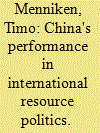

|
|
|
| 4 |
ID:
184647


|
|
|
|
|
| Summary/Abstract |
A handful of companies dominate the world’s shipping industry. These firms have gained political leverage over the global governance of container shipping in particular. Intriguingly, in recent years the Danish conglomerate Maersk—the world’s biggest container and shipping vessel company since the mid-1990s—has been using its influence to push for higher environmental standards for the industry as a whole. To some extent these initiatives are helping to promote environmental efficiencies, cleaner fuels, and greener technology. But they are also raising costs for small and midsized companies with extremely low profit margins, further enhancing the competitiveness of the biggest shipping conglomerates in an increasingly oligopolistic market. While voluntary self-governance by companies such as Maersk is incrementally improving the environmental management of global shipping, it is also further concentrating governance power within a few transnational corporations, potentially taking more ambitious regulation off the agenda.
|
|
|
|
|
|
|
|
|
|
|
|
|
|
|
|
| 5 |
ID:
046119
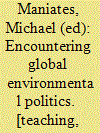

|
|
|
|
|
| Publication |
Lanham, Rowman and Littlefield Publishers, 2003.
|
| Description |
xii, 262p.
|
| Standard Number |
0847695425
|
|
|
|
|
|
|
|
|
|
|
|
Copies: C:1/I:0,R:0,Q:0
Circulation
| Accession# | Call# | Current Location | Status | Policy | Location |
| 046637 | 363.70071/MAN 046637 | Main | On Shelf | General | |
|
|
|
|
| 6 |
ID:
111902
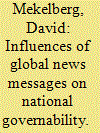

|
|
|
|
|
| Publication |
2012.
|
| Summary/Abstract |
The environment has been forced to the margins of Israeli political discourse in the past and has received little attention from formal institutes. Nevertheless, since the mid-1980s, environmental consciousness and public discourse have increased, mainly encouraged by Israeli civil society. This paper argues that since Israeli governmental and educational systems do not deal with environmental issues, the development of environmentalism in Israeli society is the outcome of a three-step process: first, an increase in the homogenization of cross-border messages; in turn this contributes to the homogenization of principles, norms, rules and decision-making procedures; and finally, plays a role in creating a greater sense of belonging to the global community. The paper probes the development of global environmental messages' influence on Israeli society and politics between the two first main UN environmental conferences of 1972 and 1992 by presenting a qualitative and quantitative analysis of The New York Times (USA), The Times (UK) and Ma'ariv and Yediot Ahronot (Israel) during the time of these conferences. A comprehensive survey is presented, along with interviews with representatives from 78 environmental NGOs in Israel that were established by 1995.
|
|
|
|
|
|
|
|
|
|
|
|
|
|
|
|
| 7 |
ID:
094765
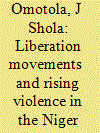

|
|
|
|
|
| Publication |
2010.
|
| Summary/Abstract |
The contest for the 'soul' of oil and its revenues in Nigeria have thrown up several actors representing diverse interests, most notably the stale, oil multinationals and oil-hearing communities. This paper is primarily concerned with what it called the new contentious site of oil and environmental polities in the Niger Delta. The contention revolves mainly around the interpretations ascribed to the current but unprecedented wave of violence in the region by the contending forces in oil and environmental politics. In the reading of militias' activities, there is a simultaneous convergence and divergence between the state and the oil majors. Both refuse to attribute rising violence to liberation struggles, as claimed by the militants. They, however, differ over the best tactical approach to the problem. The oil majors seem to prefer a more violent approach to taming the monster, which violence in the Niger Delta has become. This is in sharp contradiction to the states' preference for a relatively less violent approach. This 'new' disposition of the state makes it all the more interesting, given the fact that the Nigerian state is notoriously reputed for its excesses in the Niger Delta over dissent. Overall, rising violence in the Niger Delta represents the continuation of the resource struggle by another means. Notable criminal tendencies became inevitable due to the insensitivity of the government and in order to sustain the struggle.
|
|
|
|
|
|
|
|
|
|
|
|
|
|
|
|
| 8 |
ID:
171192
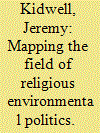

|
|
|
|
|
| Summary/Abstract |
Until fairly recently, consideration of religion has been marginal or even non-existent in the scholarly discourse about environmental politics. Renewed attention to the intersection of these fields has been encouraged by a recent widening in discussions of ‘environmental values’ to include the role of religious institutions and personal belief in forming spiritual environmental values and renewed attention to the place of ethics and religious institutions in global environmental politics. Following a range of historic declarations by religious leaders, the recent encyclical by Pope Francis signalled a new level of integration between Catholic concerns for social and environmental justice. Yet, much of the continued engagement by large environmental NGOs and governments has continued to ignore the complex interrelation of local, intermediate and transnational religious political ecology. In this article, which is based on data gathered during five years of fieldwork, primarily with British Christian REMOs (religious environmental movement organizations), I probe the complexities of political engagement with religious environmentalism which arise from the many different organizational iterations these groups may take. On the basis of such investigation I suggest that effective high-level engagement with REMO groups will be greatly enhanced by a nuanced understanding of the many different shapes that these groups can take, the various scales at which these groups organize, and the unique inflection that political action and group identity can take in a religious context.
|
|
|
|
|
|
|
|
|
|
|
|
|
|
|
|
| 9 |
ID:
137134
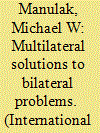

|
|
|
|
|
| Summary/Abstract |
Based on archival sources, this article analyzes the Canadian contribution to the United Nations Conference on the Human Environment. It finds that continental imperatives were of pivotal importance in the development of Canadian foreign environmental policy at the Stockholm conference and its preparatory meetings. In the context of the passage of Canada’s Arctic Waters Pollution Prevention Act, Canadian diplomats set out to use the 1972 conference as a tool to fuel the progressive development of international environmental law and to generate support for a set of marine pollution principles. Following the conference, Canadian officials employed the gains achieved at Stockholm to legitimize and institutionalize the government’s unilateral Arctic anti-pollution measures. In so doing, the government of Pierre Elliott Trudeau sought multilateral solutions to bilateral problems in the environmental sphere.
|
|
|
|
|
|
|
|
|
|
|
|
|
|
|
|
| 10 |
ID:
193298
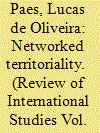

|
|
|
|
|
| Summary/Abstract |
This article proposes a processual–relational perspective on region-making and its effects in world politics. It revisits the concepts of regionalism and regionalisation to unearth the relational mechanisms underlying these archetypical pathways of regional emergence. Regionalism refers to the bounding of regions – the definition of its inside and outside, and of which actors fall on either side. Regionalisation denotes the binding of regions, the amalgamations of relations around a shared territoriality. I argue that regions affect world politics in their making through the boundaries raised and relations produced in the process. I then mobilise network theory and analysis to propose a framework for studying the making and makings of regions. Regions’ binding and bounding are rooted in brokerage dynamics that sustain clusters of relations denser inside a regional boundary, rather than outside, and allow some actors to control interactions across that boundary. I illustrate this framework with a case study on the emergence of the Amazon as a region in world politics. I analyse interaction networks in UN-level environmental negotiations involving the ecosystem. The analysis shows how the making of the Amazon has been tied to preserving the position of Amazonian states as the main brokers, speaking for and acting on behalf of the region.
|
|
|
|
|
|
|
|
|
|
|
|
|
|
|
|
| 11 |
ID:
105971
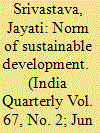

|
|
|
|
|
| Publication |
2011.
|
| Summary/Abstract |
The article engages with the theoretical debate on norms to explicate the prescriptive power of the 'norm' of sustainable development. It analyses the socio-economic and political context that have been instrumental in framing of the 'norm' of sustainable development, in particular the approach and interventions of developing countries including India. It argues that an ostensible dichotomy between development and environment has fractured the internal cohesion of the norm. The surrounding web of normative structure that marginalises principles of justice and equity is other formidable explanation for its fragile compliance.
|
|
|
|
|
|
|
|
|
|
|
|
|
|
|
|
| 12 |
ID:
160964
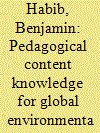

|
|
|
|
|
| Summary/Abstract |
Pedagogical design in international relations and environmental politics needs to help students become active participants in the sustainability transition. This article documents the use of a blog-based assessment activity in an international relations undergraduate course Global Environmental Politics. The activity has a multifunctional design that draws on different forms of pedagogical content knowledge to enhance student learning. These include metacognitive skill development in relation to environmental politics, cultivation of professional networks in the environment and sustainability field, and methods of active participation in the politics of the sustainability transition. Blog-based representations of pedagogical content knowledge can be replicated across international relations curricula.
|
|
|
|
|
|
|
|
|
|
|
|
|
|
|
|
| 13 |
ID:
087690
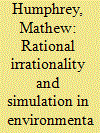

|
|
|
|
|
| Publication |
2009.
|
| Summary/Abstract |
Do western publics make 'demands' for environmental policy that they have no desire to see enacted? The thesis that they do has been put forward recently by advocates of the 'post-ecologist' paradigm such as Ingolfur Blühdorn. Taking the example of climate change, this article assesses survey results that provide indicative evidence that such 'simulative' demands may exist. I suggest that such demands are, however, best explained through conceptual tools available from game-theoretic and rational-actor models of political behaviour, in particular rational ignorance and rational irrationality, rather than with the societal-level accounts preferred by Bluhdorn and others.
|
|
|
|
|
|
|
|
|
|
|
|
|
|
|
|
| 14 |
ID:
134413
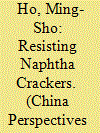

|
|
|
|
|
| Summary/Abstract |
Protests against naphtha crackers have been an important trend in Taiwan’s environmentalism since their emergence in the mid-1980s. This article analyses ten protest cases (1987-2011) to understand the evolution of environmental politics. I draw the following conclusions: (1) with the growing public awareness of pollution, new petrochemical projects are increasingly facing popular opposition; (2) the environmental movement assumes less partisanship, although ideological differences between the political parties still remains; (3) the mobilising capacity of NGOs is on the rise and has become the key factor in the success of protests.
|
|
|
|
|
|
|
|
|
|
|
|
|
|
|
|
| 15 |
ID:
186694


|
|
|
|
|
| Summary/Abstract |
Drawing critical resources from Hannah Arendt, this article argues for a revaluation of the appearances of nature in environmental political theory and practice. At a time when pervasive anthropogenic contamination threatens the very survival of vulnerable communities and species, it would be wrong to revive the timeworn mythos of nature as an untrammeled beauty. Instead, with Arendt’s help, I advocate an environmental politics rooted in an alternative aesthetic of nature, one that respects and seeks to protect earth’s diverse lifeforms for the sake of their strange, disquieting appearances of otherness. Earth’s living displays of alterity are valuable, I argue, for their propensity to upset the destructive logic of mass production and consumption and spur political action. In an Arendtian frame, we can better recognize interdependence between biological and political life and appreciate the role of nonhuman lifeforms in constituting spaces of appearance where human freedom and plurality may flourish.
|
|
|
|
|
|
|
|
|
|
|
|
|
|
|
|
| 16 |
ID:
169143
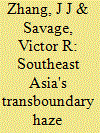

|
|
|
|
|
| Summary/Abstract |
This paper examines the political intricacies inherent in the management of Southeast Asia's transboundary haze pollution. It argues for a scalar perspective in understanding the complexities of the haze problem. The so‐called ‘inconvenient truth’ is unravelled by teasing out some issues in the national and regional political ecologies, and the challenges of synchronising co‐operation at the national, regional and global scales. Discussion shows that the ‘environment’ takes on different meanings at each scale, and both Indonesia and the Association of Southeast Asian Nations (ASEAN) need to recognise this in order to engage more effectively with the transboundary environmental issue. Specifically, inadequate management of forest resources in Indonesia, ASEAN's principle of ‘non‐interference’ and a lack of a holistic ecosystem perspective are amongst some of the interconnected issues addressed. The paper calls for a greater awareness of structural weaknesses in the management of forest resources and a change in ASEAN's environmental paradigm to a more holistic ecosystem perspective that prioritises not just environmental and human health, but also a healthy and sustainable ecosystem.
|
|
|
|
|
|
|
|
|
|
|
|
|
|
|
|
| 17 |
ID:
092664
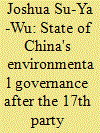

|
|
|
| 18 |
ID:
117818
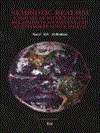

|
|
|
|
|
| Publication |
Zurich, Lit Verlag GmbH Co, 2007.
|
| Description |
157p.pbk
|
| Standard Number |
9783825804770
|
|
|
|
|
|
|
|
|
|
|
|
Copies: C:1/I:0,R:0,Q:0
Circulation
| Accession# | Call# | Current Location | Status | Policy | Location |
| 057090 | 327.101/ALR 057090 | Main | On Shelf | General | |
|
|
|
|
| 19 |
ID:
118244
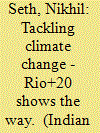

|
|
|
| 20 |
ID:
092370
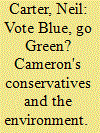

|
|
|
|
|
| Publication |
2009.
|
| Summary/Abstract |
How genuine is the Conservative party's rediscovery of the environment? Would a Conservative government led by David Cameron implement a wide-ranging and progressive environmental policy? This article explores why Cameron has embraced the environment so enthusiastically when Conservative governments have had a poor record of environmental protection and the Conservative party has traditionally shown little interest in the issue. It assesses the impact of Cameron's strategy both on his own party and on the wider world of environmental politics and it evaluates the continuing commitment of the Conservatives to the issue by assessing what kind of policies a future Conservative government might implement. Although Cameron remains committed to the issue and he has already had a positive impact on Labour government policy, he has not yet convinced his party or its supporters, so a future Conservative government would probably represent continuity rather than significant change in environmental policy.
|
|
|
|
|
|
|
|
|
|
|
|
|
|
|
|
|
|
|
|
|